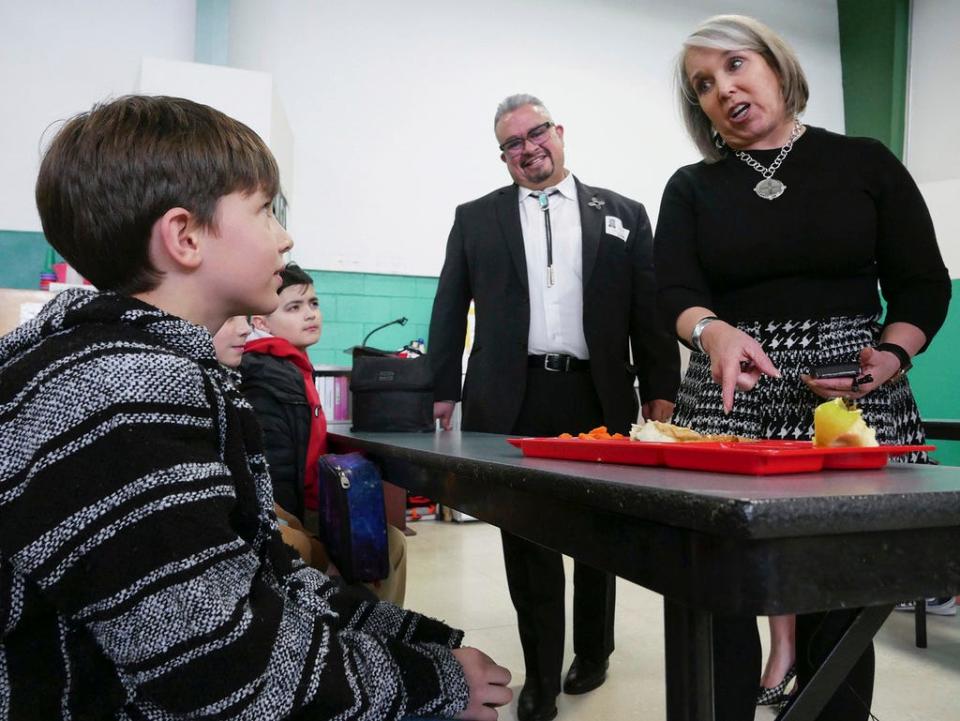If passed, this legislation would help schools provide more meals to students
- Oops!Something went wrong.Please try again later.
New Mexico became one of four states to enact a free school lunch program for all students regardless of income this year.
Roughly $30 million in state funds will be used to cover the costs alongside existing federal funds provided through the National School Lunch Program.
However, a majority of U.S. schools still face the dilemma of providing adequate healthy meals to all students. This issue is at the forefront of a new school meal legislation introduced by lawmakers.
Ending child hunger in U.S. schools
Sen. Martin Heinrich (D-NM) along with Senate colleagues John Fetterman (D-PA) and Raphael Warnock (D-GA) co-authored the Healthy Meals Help Kids Learn Act, which will address how much schools are reimbursed for meal costs at the federal level.
“By permanently increasing the federal school meal reimbursement rate, the Healthy Meals Help Kids Learn Act is an important step toward keeping all of America’s kids fed," Heinrich said. "When we invest in our children, we invest in our future.”

Currently, the National School Lunch Program provides funding for school breakfast and lunches through an annual reimbursement by a fixed rate for free, reduced or paid meals.
Last summer, Congress passed a temporary one-year increase in reimbursements in the Keep Kids Fed Act to help with inflation and rising costs. It expired this past summer.
Under the act, schools were receiving an additional 40 cents for lunch and 15 cents for breakfast reimbursements. The 2023-2024 rates without the additional reimbursements are as follows:
Free — $2.26 per breakfast, $4.33 per lunch
Reduced — $1.96 per breakfast, $3.93 per lunch
Paid — $0.50 per breakfast, $0.77 per lunch
As a result of the additional reimbursements expiring, schools are often left with slightly less funding for meals and less opportunity to invest in quality produce, staffing, equipment and resources for their school meal programs.
A 2023 report from the School Nutrition Association surveyed schools that utilized the extra funds from the Keep Kids Fed Act and pandemic relief waivers that allowed districts to offer free meals if they previously charged for them.
The report determined that schools were impacted when those funds were no longer available.
Student lunch debt increased according to 96.3% of respondents (680 schools) and only around a quarter of surveyed respondents felt the reimbursements were enough to cover costs.
“No child should be worried about where their next meal comes from, and no child should ever be in debt because they can’t afford school lunch," Fetterman said. "This bill will provide schools the necessary resources to meet our children’s basic needs.”
Under the Healthy Meals Help Kids Learn Act, schools would get a permanent increase of 45 cents more per lunch and 28 cents more per breakfast reimbursement.
Georgia Senator Raphael Warnock said the act could help students stay focused and energized in the classroom.
“The more we learn about the lasting impact of food insecurity on children, the more important it becomes for Congress to strongly support school breakfasts and lunches," Warnock said. "I’m proud to join Senators Heinrich and Fetterman in this critical effort to address childhood hunger in every corner of Georgia and the country.”
How would the act impact New Mexico?
New Mexico has led the initiative for universal school meals with passage of Senate Bill 4.
However, the Healthy Meals Help Kids Learn Act would provide additional support for schools to invest in quality produce and supplies as well as to comfortably adjust or expand existing operations.
SB 4 offsets the costs after federal dollars are reimbursed.

Roughly 73% of New Mexico students qualify for free or reduced meals under federal law which Heinrich says is a clear indication expansion of federal reimbursements is needed in the state and nationally.
According to the New Mexico Public Education Department, about 67% or 309,000 students actually qualify for the National School Lunch Program.
“New Mexico sent a strong message to the rest of our nation when it passed universal school meals," Heinrich said. "Every child deserves a quality education and a fair shot at success. That means no child goes hungry."
What’s the long-term strategy?
Although the Healthy Meals Help Kids Learn Act would provide more federal reimbursements to schools, it still does not ensure every child in America is provided a meal at no cost.
Heinrich along with Senators Bernie Sanders and Kirsten Gillibrand introduced the Universal School Meals Program Act in May with the hopes that it will provide free meals to all students regardless of income to end hunger in schools.
If signed into law, the act would increase federal reimbursements to cover breakfast, lunch and snacks, close any gaps between existing school lunch programs, reimburse schools for any accrued meal debt and expand summer lunch programs.
Ernesto Cisneros is a reporting fellow with the UNM/NM Local News Fund program. He covers education for the Sun-News and can be reached at ECisneros@lcsun-news.com. Follow him on X, formerly Twitter at @_ernestcisneros.
This article originally appeared on Las Cruces Sun-News: Healthy Meals Help Kids Learn Act

